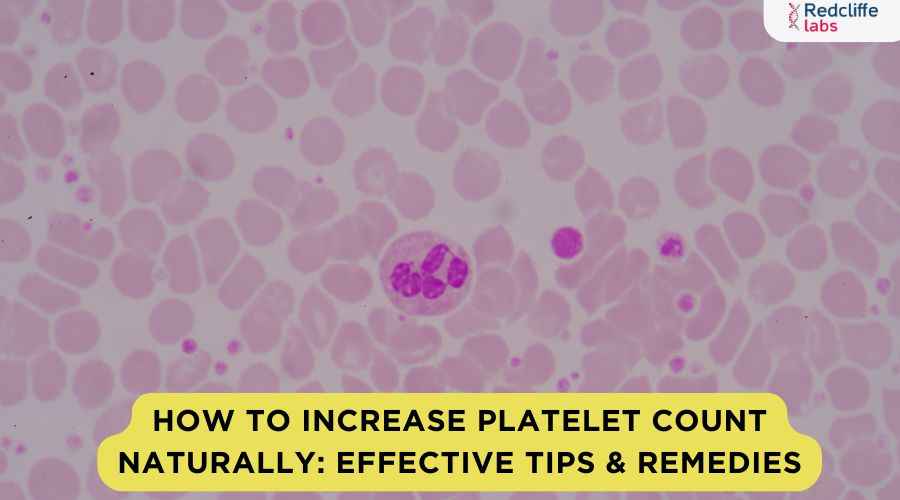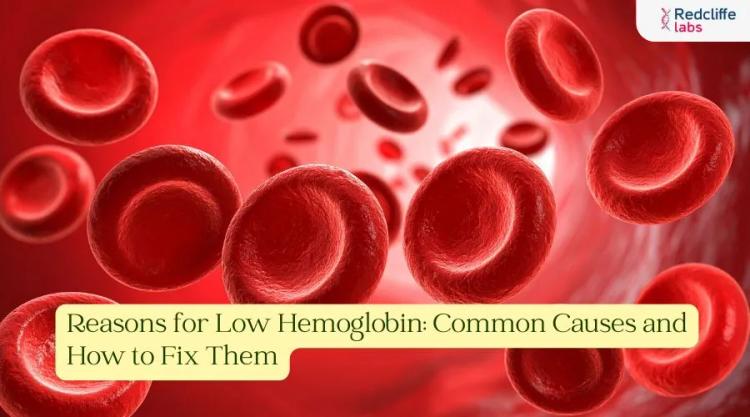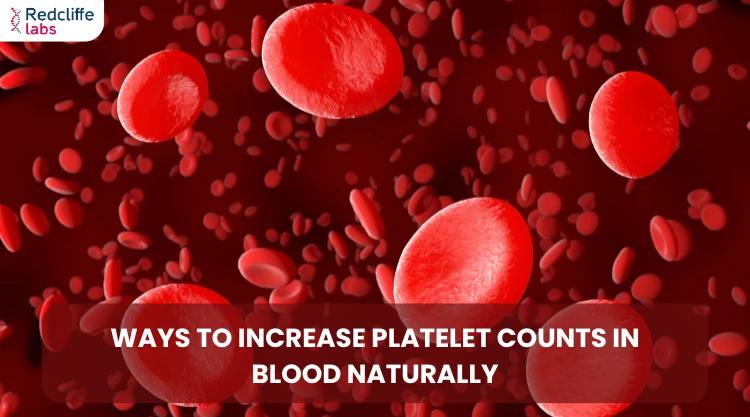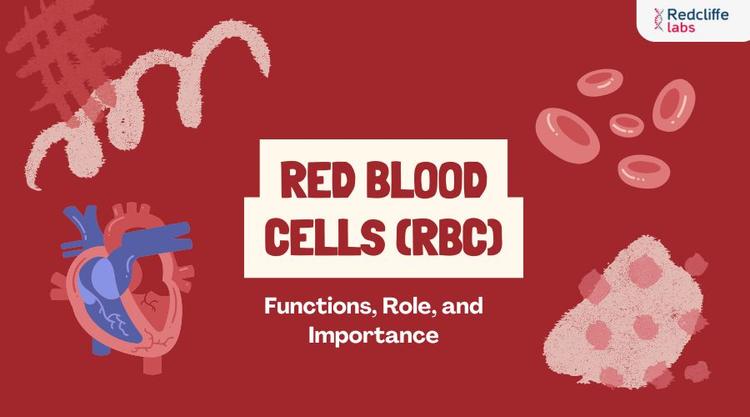How to Increase Platelet Count Naturally: Effective Tips & Remedies

Medically Reviewed By
Dr Divya Rohra
Written By Kirti Saxena
on Feb 11, 2025
Last Edit Made By Kirti Saxena
on Jul 19, 2025

Are you looking for ways to increase your platelet count naturally? Yes, then you are reading this blog right.
Platelets are one of the major and powerful components of blood that play a crucial role in healing and preventing excessive bleeding.
In this article, we will explore platelet-boosting foods, tips for improving your platelet count, and the causes and symptoms of low platelet count to improve overall health. Whether you are dealing with low platelet count or seeking ways to raise platelet levels during dengue, this blog has it all.
What are platelets?
Platelets, also known as thrombocytes, are produced in the bone marrow and help clotting and prevent excessive bleeding. Several factors, including medical issues, medications, and certain lifestyle habits, can cause low platelet count. Increasing platelet count naturally can help improve overall health and maintain proper clotting mechanisms.
The normal platelet count range in an average adult is 1,50,000 to 4,50,000 platelets per microlitre of blood. A platelet count of less than 1,50,000 puts a person at risk of bleeding.
What Causes a Low Platelet Count?
A low platelet count refers to a condition called thrombocytopenia. The low platelet count might be due to a variety of reasons, including-
- Viral Infections- Certain viruses, such as dengue fever, hepatitis, or HIV, can temporarily decrease platelet production or increase their destruction.
- Autoimmune Disorders- In conditions like immune thrombocytopenic purpura (ITP), the immune system mistakenly attacks its system and starts destroying platelets.
- Bone Marrow Disorders—Some health conditions that affect the bone marrow, including leukemia or aplastic anemia, can affect platelet production.
- Medications- Some drugs and medications like antibiotics and chemotherapy can impact platelet production.
- Nutritional Deficiencies—A Lack of essential nutrients like vitamin B12, folate, or iron can hinder the production of healthy platelets.
- Alcohol Consumption- Too much alcohol intake can interfere with platelet production and function.
- Chronic Diseases- Conditions like liver cirrhosis or kidney disease may also reduce platelet counts.
Understanding these causes is crucial because addressing the underlying issue—a nutritional deficiency, an autoimmune problem, or an infection—can often improve platelet production and overall health.
Common Symptoms of Low Platelet Count
A low platelet count symptoms may vary from person to person. Here are some common signs of low platelet count includes-
- Tiny, reddish-purple spots, called petechiae, commonly on your lower legs
- Bleeding from minor injuries that don't stop after 15-20 minutes
- Easily bruising
- Frequent nose bleeding
- Bleeding gums
- Fatigue
- Blood in your urine or stool
- Heavy menstrual flow
If you experience these symptoms, seek immediate medical attention to identify the cause and get timely treatment.
Also Read: Platelet Count: Low vs. Normal vs. High Range in Human
How to Increase Platelet Count Naturally?
Many of you know these natural remedies to increase platelet count. Let's explore several effective natural remedies and foods known to support platelet production.
Papaya Leaf Extract
You might have heard about the Papaya leaf extract to increase the platelet count.
Papaya is popularly known as a natural remedy for low platelet counts, especially dengue fever. Its leaves are rich in antioxidants and possess anti-inflammatory properties. They stimulate the bone marrow and increase platelet production.
Green Vegetables
Yes, green leafy vegetables like kale, swiss chard, and spinach are rich sources of essential vitamins and minerals that support overall blood health.
These leafy greens are rich in vitamin K, critical for blood clotting, and folate, which helps produce new cells, including platelets. If you have a low platelet count, add various green-leafy vegetables to your diet to maintain healthy platelet levels.
Milk
Surprised? Yes, milk is a good source of essential nutrients, including vitamin D, calcium, and protein, which help maintain good bone and blood health.
Protein is vital for the production of all blood cells, including platelets. Drink a glass of milk dairy or consume dairy products such as yogurt drinks and cheese to maintain a balanced diet that supports platelet production.
Aloe Vera
Aloe vera is known for its soothing and healing properties, which are good for the digestive system. Aloe vera juice is loaded with antioxidants and vitamins that may help improve platelet counts.
Aloe vera helps purify blood and prevent infections. It also increases platelet count and helps to increase the platelet counts. However, it's important to note that you must consume aloe vera juice in moderation. It is better to consult your doctor before adding it to your daily diet.
Vitamin C
Vitamin C is an effective antioxidant that not only boosts your immune system but also plays a role in collagen synthesis. Vitamin C helps in tissue repair and wound healing. Foods rich in vitamin C—such as citrus fruits, berries, and bell peppers—can help support the body's natural ability to produce platelets.
Some good sources of Vitamin C are-
- mangoes
- pineapple
- broccoli
- tomatoes
- cauliflower
Beetroot
Beetroot is a nutrient-rich vegetable that contains a good amount of iron, folate, and antioxidants.
Beetroot juice or beetroot added to salads can help enhance the body's capacity to produce platelets naturally.
Indian Gooseberry (Amla)
Indian gooseberry, commonly known as amla, is a superfood celebrated for its high vitamin C content and antioxidant properties.
Amla can boost the immune system and improve blood health. Adding it to your diet—either as fresh fruit, juice, or powder—can support platelet production and overall well-being.
Wheatgrass
Wheatgrass contains essential vitamins like Vitamins A, C, and E and minerals like iron and calcium. This superfood possesses detoxifying properties, which boosts your immunity.
Iron-Rich Foods
Iron is vital for producing hemoglobin and healthy blood cells, including platelets. Add iron-rich foods such as lentils, beans, tofu, and fortified cereals to your daily diet to improve your hemoglobin levels and overall blood cells.
Vitamin K-Rich Foods
Vitamin K is a fundamental component of blood clotting, making it an important nutrient for those with low platelet counts. Broccoli, Brussels sprouts, and green leafy vegetables are rich in vitamin K.
Add these foods to your diet to support the clotting function of your blood while promoting overall health.
Zinc-Rich Foods
Zinc is vital for cell division and immune function, helping to maintain a healthy platelet count. Pumpkin seeds, chickpeas, lentils, and nuts are excellent sources of zinc. Eat these foods to improve your platelets and enhance your immunity.
Pomegranate
Pomegranate contains antioxidants and anti-inflammatory properties that can help protect your body’s cells, including those in the blood.
Consume pomegranate daily to improve blood circulation and support the body's natural healing processes, including platelet production.
Folates
Folate (vitamin B9) is essential for cell division and the production of new cells, including platelets. Foods rich in folate, such as dark leafy greens, legumes, and fortified grains, can help maintain healthy platelet levels and overall blood health.
Kiwi
Kiwi is not only delicious but also packed with vitamin C, vitamin K, and fiber, which makes it an excellent choice for increasing platelet count. Its high antioxidant content helps combat oxidative stress, and vitamins support blood health and platelet production. Eat a kiwi daily to boost your platelet count.
Eggs
Eggs are a nutrient-dense food that offers high-quality protein, vitamins, and minerals. They contain vitamin D and B vitamins, which help produce blood cells.
Eat eggs daily to improve your overall health and maintain a healthy platelet count.
Foods to Increase Platelet Count
Here is a list of some of the best foods that can help to improve your platelet count:
- Citrus Fruits- Oranges, lemons, and grapefruits.
- Berries- Strawberries, blueberries, and raspberries.
- Leafy Greens- Spinach, kale, and collard greens.
- Nuts and Seeds- Almonds, walnuts, pumpkin seeds, and sunflower seeds.
- Legumes: Beans, lentils, and chickpeas.
- Whole Grains: Foods like brown rice, quinoa, and oats.
- Dairy Products: Milk, yogurt, and cheese.
Read more: Foods to Increase Platelet Count: A Natural Approach.
Food To Avoid: To improve your Platelet Count
Certain foods can help increase your platelet count, but others may hinder your progress or exacerbate low platelet levels. It is wise to limit or avoid the following:
- Processed Foods- Foods that contain artificial additives, preservatives, and unhealthy fats can trigger inflammation and weaken overall health.
- Sugary Foods and Beverages- Excessive sugar can lead to inflammation and immune system dysregulation.
- Trans Fats- Often found in fast foods, baked goods, and fried items, trans fats can interfere with proper nutrient absorption.
- Excessive Alcohol- High alcohol consumption can affect your liver function and reduce the production of platelets.
- Caffeinated Beverages- In large amounts, caffeine may contribute to dehydration and affect your health negatively.
Home Remedies to Increase Platelet Count
Several home remedies to increase platelet count have been used for generations in Indian Kitchens. Here are a few home remedies-
- Papaya Leaf Juice
- Amla Juice
- Beetroot Smoothie
- Wheatgrass Juice
- Aloe Vera Drink
- Herbal Tea
The Final Thoughts
To increase your platelet count naturally; you do not have to add the foods mentioned above; you just have to maintain a healthy diet and active lifestyle.
Consuming papaya leaf extract, green vegetables, and nutrient-rich foods, as well as avoiding processed and inflammatory items, is a step towards a healthier diet that can help promote overall blood health.
Always remember that natural remedies and nutritional adjustments are beneficial but should not replace professional medical advice.
Always consult your healthcare professional before changing your diet or starting new supplements. Proper blood tests are also recommended for accurate diagnosis and care.
FAQ’s
1. Which food increases platelets in the blood?
Foods rich in vitamin C, B12, folate, iron, and vitamin K can help increase platelet count. Foods like citrus fruits like oranges and grapefruits, strawberries, amla, and leafy green vegetables like spinach, kale, mustard greens, and lentils are also good.
2. Does milk increase platelet count?
Yes, milk can help increase platelet count. It is a rich source of calcium, protein, vitamin D, folate, and vitamin K, all of which can improve blood platelet count.
3. How do we increase platelet count fast in dengue?
Eat foods like kiwi, oranges, eggs, broccoli, lentils, nuts, and beetroot, drink coconut water, and take prescribed medications to increase platelet count fast in dengue.
Leave a comment
1 Comments
jose figueroa
Apr 15, 2025 at 3:58 PM.
Thanks good information
Myhealth Team
Apr 16, 2025 at 2:07 PM.
You're Welcome!



